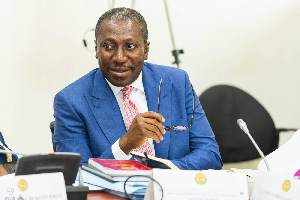A few years ago, in Ghana, we could only listen to one radio station (FM), public and monotonous one. Today, with about fifty stations in the country, out of which 12 are in Accra, we can hear a multitude of opinions and songs. Taboos have disappeared; we even talk in details about homosexuality, a topic that is usually not discussed openly in Africa.
Consequences of this situation are both alarming and positive. Debates allow for a higher political conscience. It helps inform the population on the dangers of AIDS and above all, it contributes to open the minds of a society, which have been kept under close control by the state since independence.
Private stations like Peace, Vibe, Choice, JOY and Gold FM are fighting for scarce publicity budgets to finance their programmes. With such a number of stations, temptation is big to sink into sensationalism and peddling of scandals. This is very much so if we know that the body power and means. “We had only one station and suddenly we find 50 of them. We didn’t have the possibility to train people in order to adapt,” a local journalist explained to “The Ghanaian Chronicle.”
The Kufuor government is facing a challenge: bring the stations to order and introduce the notion of responsibility without encroaching on the new freedoms. This liberalisation of radio waves came with the return to the multiparty system, in the early 90s.
Former president, Jerry Rawlings who was in control till 2000 allowed for the setting up of the first private radio station in 1996. By doing this, he would have contributed, indirectly to the end of his party being in power, the Chronicle suggests. According to some journalists, proliferation of independent stations played a crucial role in the instauration of democracy in Ghana.
A government hostage of FM stations, aggressive reporting prevented fraud and violence during the 2000 presidential elections, the paper said.
President Kufuor is the first opposition candidate to have been elected through the ballot box. “Some journalists think that they are the ones who drove away the Rawlings government,” said an official of the ruling New Patriotic Party (NPP). “They forgot that Kufuor had something to do with this. They forgot that he paced all the villages of the country in two years.”
His detractors say that the government today is the hostage of these radio stations and therefore it proceeds carefully with reforms, fearing the heat of these radios.
“The coming into power of a more tolerant and liberal government gave a good chance to radio. Choice FM (a local private radio station) for example offers in one of its two renowned programmes, a sequence, truth and reconciliation entitled, “What do you know.” Victims of repression and political violence, which prevailed before, are invited to talk about their suffering sometimes in front of their torturers; “sometimes it gets out of hands. We have daily verbal confrontations. There are no rules. The moderator has to be tough and sometimes he needs to use force to contain the participants,” the station’s director of information said.
The studios soundproofed with egg boxes. The World Bank representative answers questions about structural adjustment and its consequences. If you switch to another station you will hear school children talking about another subject; government policy is the only reason for the poor quality of goods manufactured in Ghana.” Calumny is normal, particularly by the enemies of those financing the radio stations.
“All of this is disturbing me. People will get fed up with what some call verbal terrorism. The good the radios try to do will disappear. To have several radio stations could be as bad as to have only one if the public doesn’t trust anymore what it hears,” said a government official who said the UK could be of grerat help.












